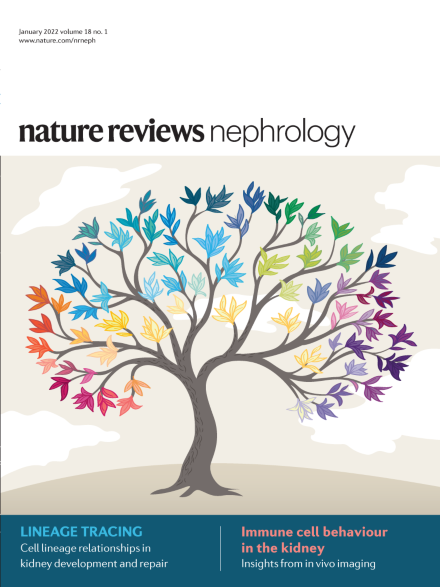Interplay between periodontitis and chronic kidney disease
IF 28.6
1区 医学
Q1 UROLOGY & NEPHROLOGY
引用次数: 0
Abstract
Periodontitis is a ubiquitous chronic inflammatory disease affecting the supporting tissues of the teeth and is a major cause of multiple tooth loss. Despite being preventable, periodontitis and dental caries are responsible for more years lost to disability than any other human condition. The most severe form of periodontitis affects 1 billion individuals, and its prevalence is increasing globally. Periodontitis arises from a dysregulated and hyperactive inflammatory response to dysbiosis in the periodontal microbiome. This response has systemic effects associated with premature mortality and elevated risk of several systemic non-communicable diseases (NCDs), including atheromatous cardiovascular disease, type 2 diabetes and chronic kidney disease (CKD). This risk association between periodontitis and NCDs is independent of their shared common risk factors, suggesting that periodontitis is a non-traditional risk factor for NCDs such as CKD. As periodontitis progresses, the immune cells and mediators underpinning its pathophysiology leak into the systemic circulation through the ulcerated oral mucosal lining, inducing in a systemic inflammatory profile that closely mirrors that observed in patients with CKD. The relationship between periodontitis and CKD seems to be bi-directional, but large-scale intervention studies are required to clarify causality and could lead to new care pathways for managing each condition as an exposure for the other. Periodontal disease is very common and might represent a non-traditional risk factor for chronic kidney disease (CKD), independently of shared risk factors. Here, the authors discuss the interplay between these two non-communicable diseases, including the potential mechanisms underlying this bidirectional relationship.


牙周炎与慢性肾脏疾病的相互作用
牙周炎是一种普遍存在的影响牙齿支撑组织的慢性炎症性疾病,是导致多颗牙齿脱落的主要原因。尽管可以预防,但牙周炎和龋齿造成的致残年数比任何其他人类疾病都要多。最严重的牙周炎影响着10亿人,其患病率在全球范围内呈上升趋势。牙周炎是由牙周微生物群失调引起的炎症反应失调和过度活跃引起的。这种反应具有与过早死亡和几种系统性非传染性疾病(NCDs)风险升高相关的全身性影响,包括动脉粥样硬化性心血管疾病、2型糖尿病和慢性肾脏疾病(CKD)。牙周炎和非传染性疾病之间的这种风险关联独立于它们共同的风险因素,这表明牙周炎是CKD等非传染性疾病的非传统风险因素。随着牙周炎的进展,支持其病理生理的免疫细胞和介质通过溃疡的口腔粘膜衬里渗漏到体循环中,诱发全身性炎症,这与CKD患者的情况非常相似。牙周炎和慢性肾病之间的关系似乎是双向的,但需要大规模的干预研究来澄清因果关系,并可能导致新的护理途径来管理每一种疾病作为另一种疾病的暴露。
本文章由计算机程序翻译,如有差异,请以英文原文为准。
求助全文
约1分钟内获得全文
求助全文
来源期刊

Nature Reviews Nephrology
医学-泌尿学与肾脏学
CiteScore
39.00
自引率
1.20%
发文量
127
审稿时长
6-12 weeks
期刊介绍:
Nature Reviews Nephrology aims to be the premier source of reviews and commentaries for the scientific communities it serves.
It strives to publish authoritative, accessible articles.
Articles are enhanced with clearly understandable figures, tables, and other display items.
Nature Reviews Nephrology publishes Research Highlights, News & Views, Comments, Reviews, Perspectives, and Consensus Statements.
The content is relevant to nephrologists and basic science researchers.
The broad scope of the journal ensures that the work reaches the widest possible audience.
 求助内容:
求助内容: 应助结果提醒方式:
应助结果提醒方式:


